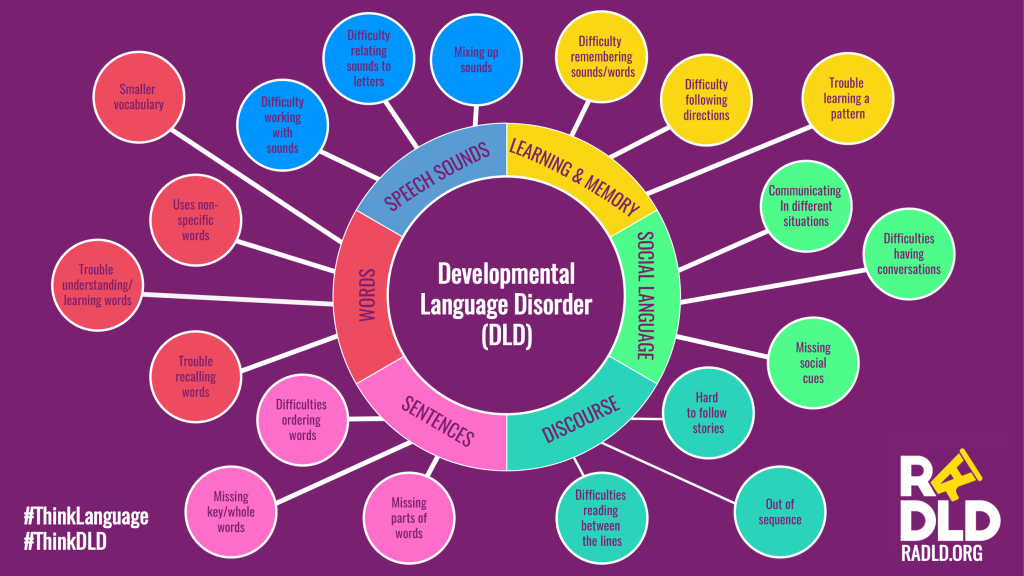This Friday, 20th October, is DLD Awareness Day. Developmental Language Disorder is still a relatively new term, introduced in 2017, and is therefore still misunderstood, unrecognised and under diagnosed. But whilst the term is new, the condition itself is not – yet it is often mistaken for other conditions.
To understand the term, it is important to look at its component parts:
- Developmental – it starts in childhood (it does not go away)
- Language – it can affect some or all of the following areas: Social Language, Discourse, Sentences word, speech sounds and Learning and Memory (for more information please see the image below)
- Disorder – this means that it is not something that children will ‘grow out of’ and is something that will have an impact on them into adulthood.

It’s important to remember that DLD is a profile, which means that no two children with DLD will experience the same set of challenges, or face difficulties in all areas. Similarly, each individual’s unique profile of language strengths and weaknesses will often change as they grow up.
DLD is a common condition, with research indicating that 1 in 14 children have DLD – this is equal to two children in a class of 30. It is thought to impact girls and boys in similar numbers.
Despite its prevalence in schools, DLD is often misinterpreted, and pupils are frequently misdiagnosed with something else. For example, when pupils are struggling with words, they may be thought to have dyslexia. Similarly, DLD can affect learning, and is often mistaken for a moderate learning delay. Furthermore, pupils may struggle to develop and maintain friendships, due to difficulties communicating and understanding the complexities of social language. Without an awareness of DLD, these children may be referred to CAMHS.
DLD can also be misunderstood due to the significant impact it can have on pupils’ behaviour. For example, pupils who have difficulty understanding what is being said to them may appear uncooperative, whilst pupils who have difficulty using words to resolve conflict may become more physical. Likewise, pupils who have difficulty ‘reading between the lines’ may seem to say the wrong thing or appear not to care. It is estimated that a very high percentage of pupils in the youth justice system have undiagnosed DLD (figures range between 30 and 90%).
DLD is more prevalent than all of the conditions mentioned above, yet it is harder to recognise simply because people don’t know about it. Therefore, it is imperative that we raise awareness about DLD and encourage staff to look out for the signs of a language disorder when a child is struggling in school.
One way to begin to identify pupils with DLD is to screen all pupils for language difficulties. There are pros and cons to screening pupils and whilst they are valuable tools, they should be used with caution.
On the positive side, screening helps to identify students who may be masking and would otherwise be missed; it can track changes (or lack of change) as pupils progress through school; it can feel like a thorough approach; it can confirm pre-held ideas and it is proactive.
On the other side, however, screening can take time; it comes with a cost (if not the screener itself, then staffing costs); there can be false negatives and positives; there needs to be an agreement on what the next steps are; plus, language needs may change over time.
As long as the condition remains relatively unknown, I believe there are not many schools that would identify two pupils in each class as having DLD. That’s why DLD Awareness Day is so important to help raise the profile of this condition and ensure pupils can receive the support that they need. Once we begin to consider DLD as a possible diagnosis, we can begin to help these pupils achieve their full potential and improve their future outcomes.
To learn more about DLD, take a look at this free toolkit especially designed for practitioners working with children with Developmental Language Disorder.
There are many more free resources on the following websites:
If you would like to discuss screening pupils or how to support pupils with targeted interventions, please get in touch with our Speech and Language Therapy Team via helen.marriott@oneeducation.co.uk
Please complete the form below and we will get in contact as soon as we can to help you with your query.











